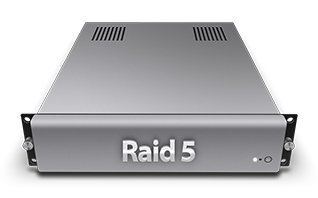Nottingham Data Recovery – RAID 5 and RAID 10 Data Recovery Specialists
With 25 years of expertise, Nottingham Data Recovery is your trusted partner for professional RAID 5 and RAID 10 data recovery services. Whether you are a home user, small business, or large multinational corporation, we specialise in recovering data from all RAID configurations and systems.
Why Choose Nottingham Data Recovery?
- Expertise You Can Trust: 25 years of RAID recovery experience.
- Advanced Recovery Services: Handling arrays from 2 disks to 64 disks.
- Comprehensive Coverage: Recovery for software RAIDs, hardware RAIDs, NAS, large NAS, and rack-mounted RAID systems.
- Free Diagnostics: Transparent and risk-free evaluation of your RAID system.
RAID 5 and RAID 10 Systems We Handle
We specialize in recovering data from all types of RAID systems, including:
- Software RAIDs
- Hardware RAIDs
- NAS Devices
- Large NAS Systems
- Rack-Mounted RAIDs
Supported RAID Brands
We recover RAID data from all major brands, including:
- Dell EMC
- Hewlett Packard Enterprise (HPE)
- Synology
- QNAP
- NetApp
- Western Digital (WD)
- Seagate
- Buffalo Technology
- Drobo
- Netgear
- Lenovo
- Intel
- ASUS
- Promise Technology
- LaCie (A Seagate Company)
- IBM
- Adaptec by Microchip
- Areca
- Thecus
Common RAID 5 and RAID 10 Issues We Resolve
RAID 5 and RAID 10 configurations offer redundancy and performance benefits but are not immune to failures. We handle the following issues:
RAID 5 Issues
1. Multiple Drive Failures
- Cause: Loss of more than one drive exceeds RAID 5’s single-drive fault tolerance.
- Impact: Data becomes inaccessible or irrecoverable without professional recovery.
2. Parity Drive Failure
- Cause: Corruption or failure of the parity data stored across drives.
- Impact: Redundancy is compromised, leading to potential data loss.
3. RAID Controller Failure
- Cause: Malfunctioning or failed RAID controller hardware.
- Impact: Prevents access to RAID configuration and stored data.
4. Rebuild Failures
- Cause: Errors during the rebuild process after replacing a failed drive.
- Impact: Data becomes corrupted or incomplete.
5. Logical Corruption
- Cause: File system corruption or software-related errors.
- Impact: Data is inaccessible despite functional drives.
6. Disk Removal or Reordering
- Cause: Drives removed or reinserted in an incorrect sequence.
- Impact: Loss of RAID metadata, rendering the array unusable.
7. Firmware Bugs
- Cause: RAID management software or firmware errors.
- Impact: Corruption of RAID configuration or failure to access data.
8. Bad Sectors
- Cause: Drives develop unreadable sectors over time.
- Impact: Data becomes fragmented or inaccessible.
9. Power Surges
- Cause: Electrical spikes damaging drives or the controller.
- Impact: Drives fail, and the RAID array becomes unresponsive.
10. Accidental Initialisation
- Cause: RAID array is mistakenly reinitialized or reset.
- Impact: Previous data is overwritten or lost.
RAID 10 Issues
11. Multiple Drive Failures in the Same Mirror Set
- Cause: Loss of drives within a single mirrored set.
- Impact: Complete data loss from affected sections of the array.
12. Rebuild Failure
- Cause: Errors or interruptions during the mirror rebuild process.
- Impact: Data becomes corrupted or unrecoverable.
13. RAID Synchronisation Errors
- Cause: Drives become unsynchronized during operation.
- Impact: Data inconsistency across the array.
14. Mechanical Failures
- Cause: Physical issues with HDDs, such as head crashes or motor failures.
- Impact: Inability to read/write data on affected drives.
15. Overheating
- Cause: Insufficient cooling in the RAID system.
- Impact: Drives fail prematurely due to heat damage.
16. Water or Liquid Damage
- Cause: Exposure to moisture or liquid spills.
- Impact: Physical damage to drives and RAID hardware.
17. RAID Expansion Errors
- Cause: Failures during capacity expansion or drive addition.
- Impact: Array becomes unstable or inaccessible.
18. Battery Backup Unit (BBU) Failure
- Cause: Depleted or faulty battery on the RAID controller.
- Impact: Loss of cached write data during power interruptions.
19. Corrupted Metadata
- Cause: Loss or corruption of RAID configuration information.
- Impact: Prevents the RAID from mounting or functioning.
20. User Recovery Attempts
- Cause: Untrained attempts to repair or recover RAID data.
- Impact: Further corruption or overwriting of critical data.
When to Seek Professional Help
RAID 5 and RAID 10 failures require advanced tools and expertise due to:
- Striped and Mirrored Configurations: Complex data reconstruction.
- Metadata Dependence: Accurate RAID metadata is critical for recovery.
- High-Stakes Data Loss: RAID systems often store essential business or personal files.
DIY recovery attempts can worsen the situation, making it essential to contact experienced data recovery professionals.
How Professional Data Recovery Can Help
Data recovery experts can:
- Diagnose: Identify the specific RAID failure.
- Reconstruct: Rebuild the RAID array to restore access.
- Recover: Safely extract and return your critical data.
Our RAID Recovery Process
- Free Diagnostics: Assess your RAID 5 or RAID 10 system to determine the fault.
- Tailored Recovery Plan: Develop a customised recovery strategy.
- Secure Recovery: Use state-of-the-art tools to recover data safely.
- Fast Turnaround: Minimize downtime with efficient data recovery.
Why RAID Recovery Requires Experts
RAID recovery is complex due to:
- Data Striping and Parity: Reconstructing striped or parity-based data.
- Simultaneous Failures: Multiple issues requiring advanced expertise.
- Metadata Dependence: Rebuilding RAID configurations accurately.
Attempting DIY recovery can worsen the problem, making it crucial to seek professional help.
Contact Nottingham Data Recovery Today
Facing a RAID 5 or RAID 10 failure? Don’t let downtime disrupt your business or personal data access. Contact our RAID recovery specialists today for a free diagnostic and professional data recovery services. Trust Nottingham Data Recovery for the best expertise, pricing, and turnaround times in the UK!




